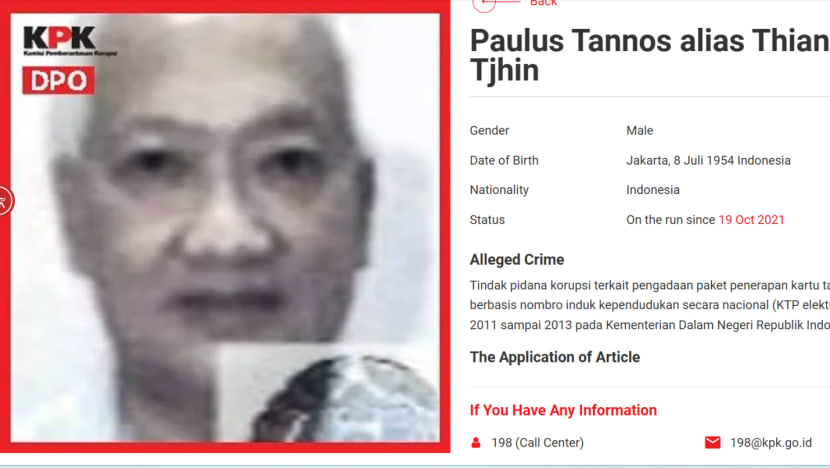Singapore Chief Justice tosses out Indonesian fugitive Paulus Tannos' bid for release on bail
The 71-year-old failed to convince the court he meets the "sick or infirm" exception for bail.

An image showing a photograph of Paulus Tannos, who has been remanded in Singapore since Jan 17, 2025. (Image: Screengrab from kpk.go.id)

This audio is generated by an AI tool.
SINGAPORE: Chief Justice Sundaresh Menon on Thursday (Oct 2) dismissed a bid by Indonesian fugitive Paulus Tannos to revive his application for bail.
Tannos, 71, failed to convince the court that he is "sick or infirm" within the meaning of the law, which is one of the exceptions that would allow a fugitive to receive bail.
By default, suspects arrested under the Extradition Act are not granted bail.
According to documents shown in court, Tannos suffers from ischemic heart disease and diabetes.
A permanent resident, Tannos has been remanded in Changi Prison since January, when he was arrested by the Corrupt Practices Investigation Bureau.
He is the subject of an extradition request by Indonesia, where he is wanted on suspicion of corruption linked to the government's electronic ID card project.
The alleged graft is said to have caused losses of about 2.3 trillion rupiah (US$140 million) to the Indonesian state.
Tannos' is the first case under the extradition treaty between Singapore and Indonesia, which came into force in 2024.
He has repeatedly declined to be surrendered to Indonesia, and his extradition hearing started at the State Courts in June.
"SICK OR INFIRM"
Tannos filed an application for bail at the State Courts in March. In June, a district judge denied bail on the grounds that he did not fall within the exception of being "sick or infirm" and posed a high flight risk.
Tannos, who is also known as Tjhin Thian Po, holds multiple passports issued by West African country Guinea-Bissau and Pacific island nation Vanuatu.
On Thursday, his lawyers – Mr Suang Wijaya and Mr Hamza Malik of Eugene Thuraisingam LLP, and Mr Nichol Yeo of Nine Yards Chambers LLC – asked the High Court to order that he be released on bail.
Mr Wijaya proposed a "middle ground" interpretation of "sick or infirm", where the fugitive must have a severe illness or infirmity.
He argued against the narrower interpretation that this must reach the level of a medical condition that cannot reasonably be managed by the Singapore Prison Service (SPS).
That was the interpretation put forth by the state and accepted by the district judge when Tannos' bail application was initially denied.
Responding for the state, State Counsels Vincent Leow, Sivakumar Ramasamy and Emily Zhao called for the court to uphold the district judge's interpretation of "sick or infirm".
On screens in the courtroom, they flashed an opinion from a senior consultant at Changi General Hospital that Tannos' heart disease was "stable" as long as he took his medication regularly.
Mr Leow also said Tannos' arguments on his health cannot be believed. He noted that in 2024, Tannos was one of the oldest participants in a table tennis competition and took three overseas holidays from September to December.
"So what we have is a man who last year was able to play table tennis, travel actively; and this year, saying these medical conditions are so serious that they cannot be dealt with in prison and asking this court to release him," said Mr Leow.
CHIEF JUSTICE'S DECISION
Chief Justice Menon dismissed Tannos' application and upheld the district judge's finding based on what he said was the only viable interpretation of the "sick or infirm" exception.
A broader interpretation based on the ordinary meanings of the words would allow bail to be sought on the slightest illness or infirmity, like a cough or cold, he said.
However, in proposing a "middle ground" interpretation, Justice Menon observed that Tannos' lawyers had difficulty identifying what criteria should be applied.
In contrast, SPS' ability to reasonably and safely manage a fugitive's medical condition was a clear and objective standard for what meets the threshold of "sick or infirm".
Chief Justice Menon noted that while in remand, Tannos was receiving medication and a low-sugar diet. SPS had said it can manage his medical conditions, was prepared to handle any medical emergencies, and was ready to arrange specialist care if needed.
He also accepted the state's arguments that Tannos' pre-existing medical conditions were stable, with no new or important developments.
"This leads me to the conclusion that the applicant does not suffer from any sickness or infirmity that cannot be managed by the SPS safely," he said.
Chief Justice Menon added that there is public interest in ensuring Singapore can meet its obligations under its extradition treaties, and that this appears to be a key consideration in the way the exceptions for bail have been crafted.
He further affirmed the district judge's decision to deny bail as Tannos was at risk of absconding, pointing to the fugitive's various passports and inconsistent accounts of how he obtained them.
The state counsels earlier flashed an image of Tannos' diplomatic passport from Guinea-Bisseau, held under the name "Joao Paolo Gomes", and his differing explanations of how he obtained that passport.
Describing this as "troubling", Mr Leow argued that while Tannos has been in Singapore for about a decade, he has family overseas and presents a high flight risk.
















